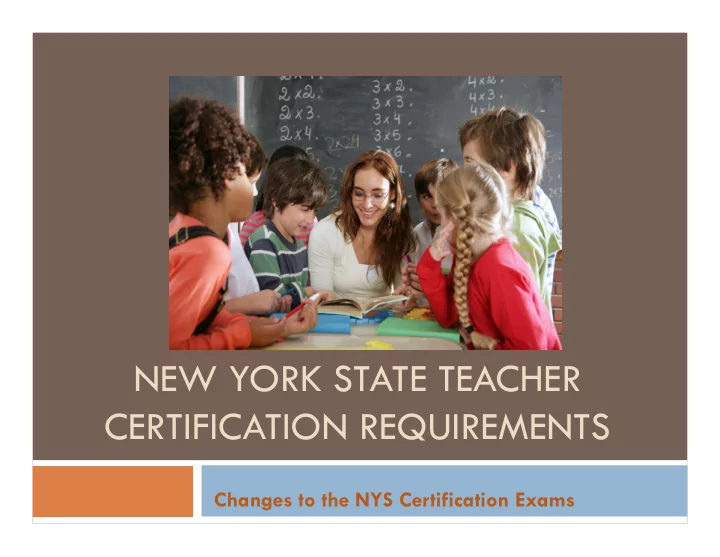

NEW YORK STATE TEACHER CERTIFICATION REQUIREMENTS Changes to the NYS Certification Exams
Initial Certification for Teachers Current Exams New Exams To be taken by those who are applying for To be taken by those who are applying for initial certification with all requirements initial certification on or after 5/1/14 completed on or before 4/30/14 Assessment of Teaching Skills- Ed TPA – Teaching Performance Assessment Written (operational F 2013) Educating All Students Test (F 2013) Liberal Arts and Science Test Academic Literacy Skills Test (F 2013) Content Specialty Tests Revised Content Specialty Tests (F 2014)
Who will these changes affect? Students who are student teaching in the fall of 2013 but not graduating until the spring of 2014. Students who are student teaching in the spring of 2014 and thereafter.
New York Certification Exam Requirements by Graduate Date
What is the ALST ? The Academic Literacy Skills Test addresses 2 competencies: 1. READING - understanding complex texts. 40 selected response items 40% of the total score for the test. 2.WRITING to SOURCES – integrate ideas and produce clear, cohesive writing. 3 constructed response times 60 % of the total score for the test 150 minutes are allotted to take the exam.
What is the EAS ? The Educating All Students Test addresses 5 competencies: 1.Diverse student populations 10 selected response and 1 constructed response 2.English language learners 10 selected response and 1 constructed response 3 . Students with disabilities & special learning needs. 10 selected response and 1 constructed response 4.Teacher responsibilities 5 selected response 5.Home–school relationships 5 selected response 90 minutes are allotted to take the exam.
What is the ED-TPA ? The edTPA is a performance assessment that intends to assess teacher candidates’ ability to demonstrate proficiency in core effective beginning teaching skills.
Designed to Contribute to Multiple Measures of Assessment TPA Capstone Embedded Signature Assessments in Assessment the Program Integration of: Analysis of Students Analysis of Case Studies Learning Curriculum/Teaching Planning • Instruction • Assessment • Analysis of Teaching • Observations/Supervisory Evaluation & Feedback with attention to Academic Language
Structure of the Exam Task One - Planning Task Two – Instruction Task Three Assessment Instructional & social context 1 or 2 video clips Analysis of whole class • • • (15 minutes combined) assessment Lesson plans • Instructional commentary Analysis of learning & • • Instructional materials • feedback to 3 students Student assignments • Assessment commentary • Planning commentary • Analysis of Teaching Effectiveness Academic Language Development
What is meant by “Academic Language”? In their instructional analysis portion of the edTPA, you will need to: Discuss the language demand across the sequence of lessons by identifying the language function that the learner needs to understand. . Discuss how the learner will be supported in developing the academic language in order to access the learning target.
15-18 rubrics Task Name: Rubric Title Guiding Question Level 1 Level 2 Level 3 Level 4 Level 5 Struggling Some skill but Acceptable Solid Advanced candidate, not needs more level to begin foundation of candidate. ready to teach. practice to be teaching. knowledge and “teacher skills. of record.” Candidate focus on Candidate focus on lesson implementation impact on student learning
Rubric Progression Expanding repertoire of skills & strategies Deepening of rationale and reflection 1 5 Not Ready Early Novice Highly Accomplished Beginner Teacher Student Focus Focus Whole Individuals/ Class Flex. Groups Intentional & Indiscriminate Well Executed
How can this assessment benefit you? It will help you to identify your teaching strengths and weaker areas. It will help you to set goals for further professional development. It will give you additional teaching practice to make you a better teacher. It will help to prepares you for the new teacher evaluation system referred to as APPR. It can help you to get ready for application for National Board certification.
From a first year teacher… “My reflection process is a habit of mind [developed through the edTPA]: What worked today? What didn’t? For whom? Why? How do I know what worked and what didn’t? What could I have done differently? To what research or resources can I turn to make this a better learning experience for my students? “The TPA led me toward the ultimate reflective performance question: How can I be a better teacher tomorrow than I was today?” --Nicole Barrick Renner, 2010
Where will you learn more about these new assessments? Academic advisement – discuss this with your advisor on March 19 th , Advisement Day. Courses in the major – your professors will be addressing some of the competencies for these exams in their courses. Student Teaching Seminar – guidance as is appropriate will be integrated into the seminar. Field Placement and Advisement Office and webpage.
What should I do now? Student teaching and graduating in the Fall 2013? Finish all of the old certification exams before December 2013. Student teaching in the Fall 2013 but not graduating until the Spring 2014? Take the EAS, ALST and edTPA in the Fall 2013 Take old CST(s) in the Spring 2014 Student teaching in the Spring 2014? Take the EAS, ALST and old CST(s) in the Fall 2014 and the edTPA in Spring 2014
Thank you for your participation .
Recommend
More recommend